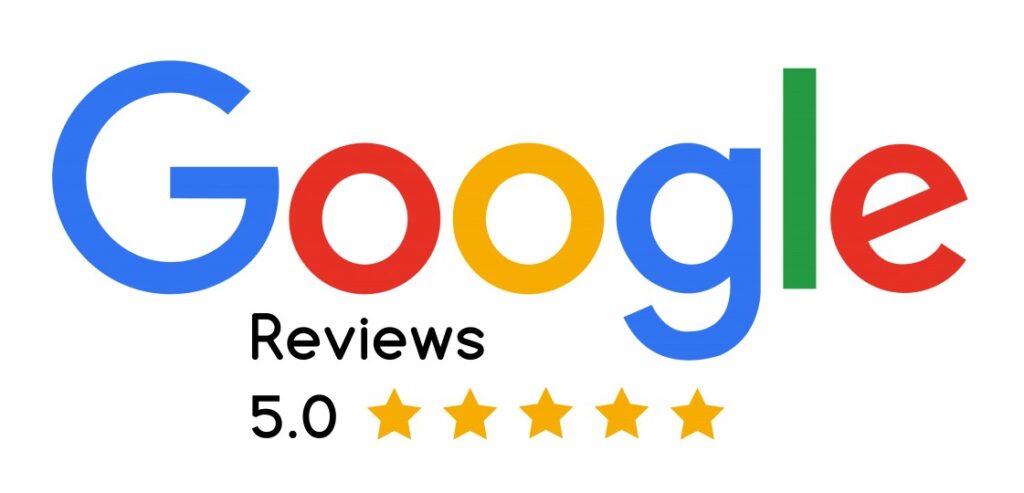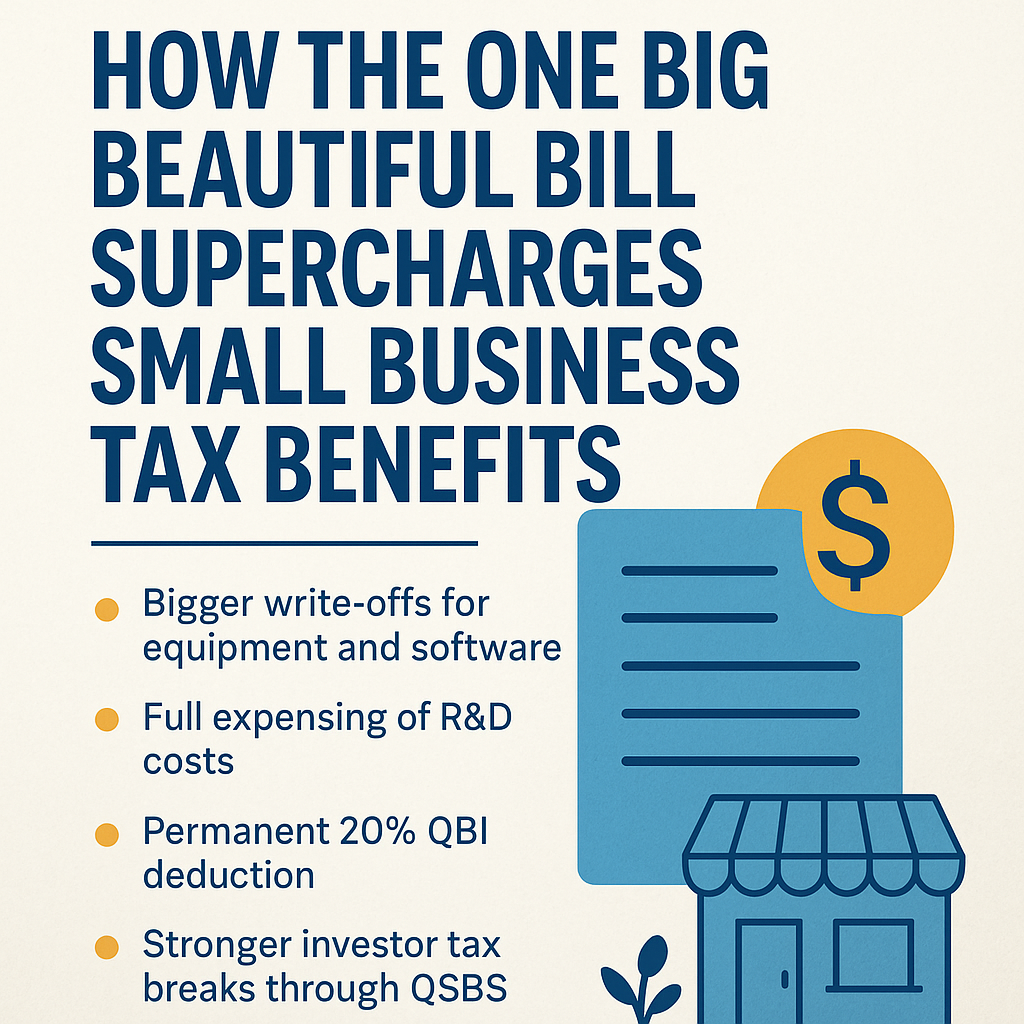On July 4, 2025, the One Big Beautiful Bill Act (OBBBA) became law, reshaping how businesses, especially small and growing ones, plan their taxes. This sweeping legislation makes popular provisions permanent, restores critical deductions, and creates new opportunities for entrepreneurs and investors.
At more than 1,000 pages, the bill is ambitious in scope, and while it touches on many areas of the economy, its tax provisions for businesses are some of the most impactful. If you own a business, the OBBBA is not just another political headline; it is a powerful tool that could influence your cash flow, long-term strategy, and even your retirement planning.
In this article, we’ll dive into the five most important provisions for businesses, explore why they matter, and give you actionable takeaways you can discuss with your CPA.
Bigger Section 179 Expensing Limits
One of the most immediate wins for business owners comes in the form of expanded Section 179 expensing. Under OBBBA, the expensing threshold doubles to $2.5 million, phasing out at $4 million. Starting in 2026, these thresholds will adjust annually for inflation, providing predictability for long-term capital planning.
Section 179 has always been a cornerstone of small business tax planning. It allows you to deduct the full cost of qualifying equipment and software in the year you purchase it, rather than depreciating it over several years. With the new limits, businesses can write off even more upfront, which means greater flexibility to reinvest profits into growth.
Example: Imagine a mid-sized construction company investing $2 million in new machinery. Under previous limits, some of that spending would have had to be depreciated over time. Now, the entire investment can be deducted in year one, cutting taxable income significantly and freeing up cash flow for payroll, marketing, or additional investment.
Takeaway: If you’re planning major purchases, whether vehicles, computers, or heavy machinery, 2025 is the time to act. The tax code now rewards immediate investment, making upgrades more affordable than ever.
R&D Expensing Is Back
Perhaps the most exciting change for innovators is the restoration of immediate expensing for domestic research and experimentation expenses. Previously, businesses were forced to amortize R&D costs over five years, creating financial strain for startups and slowing innovation. OBBBA reverses this policy, allowing full deduction in the year expenses occur. Even better, small businesses may retroactively apply this rule to certain prior costs.
This provision is a game-changer for technology companies, biotech startups, manufacturers, and even service-based businesses that rely on software development or process improvement. Innovation is costly, but being able to deduct the full expense upfront makes it easier to take risks and push forward with new ideas.
Example: A software startup spends $500,000 on developing a new application. Instead of spreading that cost over five years, they can deduct it all in 2025, reducing taxable income immediately. For a startup running on thin margins, this could be the difference between profitability and loss.
Takeaway: If you’re in a field that invests heavily in R&D, now is the time to accelerate projects. Work with your CPA to determine what qualifies and explore retroactive applications that could bring cash back into your business.
QBI Deduction Made Permanent
The 20% Qualified Business Income (QBI) deduction, established under the Tax Cuts and Jobs Act of 2017, was scheduled to sunset at the end of 2025. This deduction allows eligible pass-through entities, sole proprietorships, partnerships, and S-corporations, to reduce taxable income by up to 20%.
With OBBBA, the QBI deduction is now permanent. For millions of business owners, this creates a powerful planning opportunity with long-term stability. The uncertainty of whether the deduction would survive past 2025 has made tax planning difficult. Now, business owners can structure entities and strategies knowing this benefit will remain.
Example: A small marketing firm earning $300,000 in qualified business income can deduct $60,000, reducing the taxable amount to $240,000. Over 10 years, the permanence of this deduction could save the firm hundreds of thousands of dollars in taxes.
Takeaway: If you’ve been hesitant to restructure your business entity because of uncertainty around QBI, now is the time to revisit your options. Permanent status gives you the confidence to make long-term decisions.
QSBS Expansion for Investors & Founders
Another major boost in OBBBA comes from the expansion of Qualified Small Business Stock (QSBS) provisions. These rules have long been a favorite of startup founders and early investors, offering partial or full exclusion of gains from the sale of qualifying stock.
Under the new law:
The asset cap for qualifying businesses rises from $50 million to $75 million.
The exclusion limit for gains increases from $10 million to $15 million.
New tiered holding periods apply: 50% exclusion after 3 years, 75% after 4, and 100% after 5 years.
This makes QSBS a more flexible and attractive option for founders raising capital and for investors considering longer-term plays.
Example: An angel investor puts $1 million into a qualifying startup. After four years, they sell their stake for $5 million. Thanks to OBBBA, 75% of that gain is excluded from tax, creating massive savings. If they hold for five years, the entire $4 million gain becomes tax-free.
Takeaway: For startups, the enhanced QSBS rules could make raising money easier. For investors, the after-tax return potential just got significantly better.
Family-Friendly Workforce Credits
OBBBA also emphasizes workforce support through expanded credits. Employers can now access bigger tax breaks for offering family-friendly benefits, including:
Paid Family & Medical Leave Credit: Increased to 12.5–25% of wages paid during leave, with reduced tenure requirements for employees to qualify.
Employer Childcare Credits & Dependent Care Assistance Plans (DCAPs): Expanded contribution limits and percentages, making it easier for businesses to support working parents.
These credits not only reduce employer tax liability but also serve as retention and recruitment tools in a competitive job market.
Example: A small accounting firm offers six weeks of paid family leave to employees. With the new credits, a significant portion of the wages paid during leave can be offset through tax savings, making it less costly for the business to provide these benefits.
Takeaway: If you’ve been considering adding or expanding family-friendly benefits, now is the time. The government is helping foot the bill.
Why It Matters for Idaho Businesses
The One Big Beautiful Bill isn’t just a set of abstract tax provisions; it is a roadmap for growth. For business owners in Idaho and across the country, the opportunities are clear:
Lower Taxes, More Cash Flow: With expanded expensing and deductions, more money stays in your pocket.
Certainty for Planning: Permanent QBI and indexed Section 179 thresholds create stability.
Investment Incentives: Enhanced QSBS rules attract investors and make exits more rewarding.
Employee Retention: Credits for family leave and childcare support both your team and your bottom line.
At Idaho Tax & Bookkeeping Services, we work with businesses daily to interpret new laws and maximize opportunities. Whether you run a startup, a professional practice, or a family-owned operation, OBBBA creates new pathways to save money and grow stronger.
Action Steps to Take Now
Review Capital Purchases: Consider advancing equipment or software purchases to take advantage of new Section 179 thresholds.
Reassess Entity Structure: With permanent QBI, ensure your business type is optimized.
Explore R&D Credits: Review past and planned research expenses to maximize deductions.
Plan Exit Strategies: If you’re a founder or investor, understand how QSBS can enhance your returns.
Update Benefits Policies: Look at family leave and childcare credits to strengthen employee loyalty.
Final Thoughts
The One Big Beautiful Bill Act of 2025 is more than a political headline; it is a rare opportunity for business owners to align tax strategy with growth. From immediate cash flow boosts to long-term investment planning, this legislation opens doors that may not come again soon.
Tax law is complex, and the details matter. While this article highlights the big wins, every business situation is unique. The smartest move you can make is to sit down with a CPA who understands both the law and your goals.
At Idaho Tax & Bookkeeping Services, our mission is to help you not just comply with tax law, but thrive under it. We specialize in tax resolution, IRS representation, and strategic planning that keeps you ahead of the curve.
📞 Call us today at 208-608-5653 or visit idahotaxservices.com to schedule a consultation.
With proactive planning, the One Big Beautiful Bill Act could be the biggest opportunity your business sees this decade.



